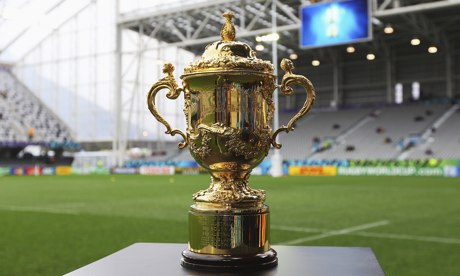
It is impossible to please everyone when staging a major international tournament and the 2015 Rugby World Cup is proving no exception. Blame it on the London Olympic afterglow, perhaps, but charging £715 for the best final seats and arranging for all England's four pool games to be 8pm kick-offs is already testing the faith of ordinary families.
The lack of discounted child tickets in the knockout stages and a cheapest adult price of £50 for Argentina v Tonga in Leicester were also among the details tucked away in the schedule announcedon Wednesday by England 2015 organisers, many of whom helped deliver last year's Olympics. They clearly hope the next Rugby World Cup will forge enough memories that people forget how much they had to fork out for the privilege.
But goodness knows it is going to cost them. Want a ticket to England's opening game against Fiji or the Cook Islands on 18 September? Even a category C adult ticket – that is, somewhere behind the dead-ball line staring at the corner flag – will set you back £160, with a posh halfway line seat available for £315. Fancy watching the final under the eaves of the vertiginous South Stand? That will be £150 a pop. "Our aim is to sell out every ticket at every venue," said Debbie Jevans, England 2015's chief executive.
The elephant in the boardroom is that the organisers have to stump up a whopping £80m for the privilege of staging the event and can claw that sum back only through ticket revenue. With Old Trafford becoming unavailable and Wembley limited to only two games because of clashes with other events, there has to be a premium paid elsewhere. The IRB hopes to make a surplus of £130m from the tournament, compared with £122.4m in 2007 and £90m in New Zealand in 2011 when the host union ended up losing £30m. The RFU hopes to make a £15m profit, quite apart from the sizeable knock-on benefits for the domestic economy.
The demands of broadcasters, however, also need accommodating which is why England's pool games are being played at night, slightly undermining ER2015's claims of family-centric entertainment. Waiting for the same packed train with thousands of other noisy fans at Twickenham station is an uncertain environment for eight-year-olds in late afternoon, never mind at 10.30pm when the pubs have been open all day and you live in Norfolk. "This is a global event with TV audiences on the other side of the world," countered Brett Gosper, the International Rugby Board's chief executive. In fairness, the 14 evening kick-offs in 2015 contrast favourably with 26 in New Zealand last time around.
The good news is that bargains will be available. Under-16s can watch the pool game between England and Wales at Twickenham for only £15, and a family of four can watch the Springboks play Uruguay or the United States at the Olympic Stadium for a grand total of £70.
There is also a better spread of fixtures for the Tier Two nations who, in most cases, will have virtually the same amount of recovery time between games as their Tier One cousins. It is a shrewd move, too, to offer the first wave of public tickets in May/June next year to rugby club members, with the rest going on general sale in September 2014. In total, say the organisers, half a million of the 2.3m available tickets will be sold at £50 or less.
By 2015 it is also hoped the planned redevelopment of Twickenham station will be mostly complete, with talks already commencing with the train companies to minimise the transport bottlenecks which afflict every major international day. As yet, though, no government intervention has been forthcoming to minimise the number of tickets being sold on by touts. "We believe passionately there should be a legislative process as there was during the Olympics," Jevans said.
There is also no guarantee the host nation will make it out of the pool, which includes Australia and Wales, an issue no organising committee can control. "If you're going to succeed, you've got to play the best and be the best," said Bill Beaumont, the RFU chairman .
Nor is there a chance of unblocking the fixture logjam which will force England to field a below-strength side in the opening Test of next year's tour to New Zealand on 7 June because of its proximity to the Premiership final.

